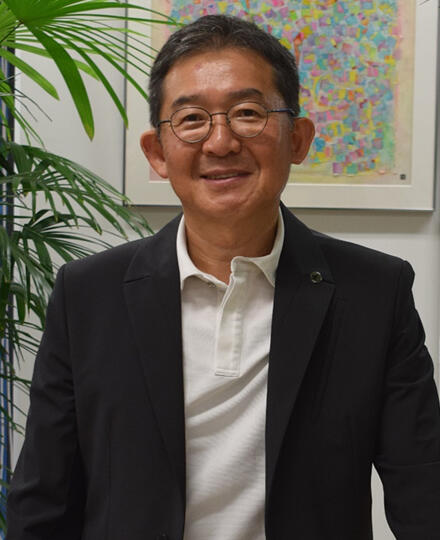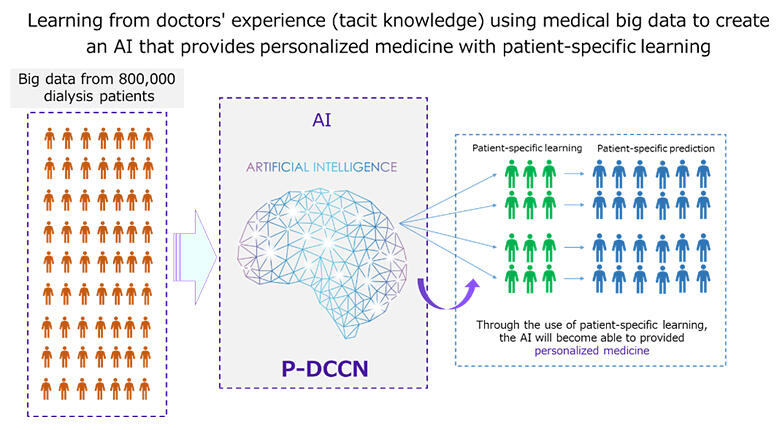What is required for the practical application of AI in medicine? This article explores an example from Tohoku University's Center for Medicinal-Hub, where data scientists and AI researchers collaborate with medical workers to develop AI for this use. This article introduces the efforts of Professor Toshio Miyata of the Center for Translational and Advanced Research, Graduate School of Medicine, Tohoku University, to develop an AI that learns from individual dialysis patients and predicts appropriate fluid removal rates.

Provided by Tohoku University
Patients with end-stage renal failure, in which kidney function has been entirely lost, must undergo dialysis three times a week for about four hours a time to remove waste products and excess water from the blood (fluid removal). In Japan, about 350,000 people are undergoing dialysis for the rest of their lives.
Insufficient fluid removal during dialysis leads to fluid retention and impairs cardiopulmonary function. However, excessive fluid removal leads to low blood pressure, producing a variety of symptoms ranging from nausea to loss of consciousness. Since dialysis hospitals typically treat dozens of patients using only one physician and a few nurses and clinical engineers, these side effects create significant burdens for medical staff when they occur. Because low blood pressure during dialysis occurs roughly 5 to 10% of the time, it is crucial to set appropriate fluid removal amounts for each individual patient. Experienced dialysis specialists set these amounts based on experience (tacit knowledge), considering the patient's overall weight gain, condition, and other factors.

Provided by Tohoku University
Miyata said, "I originally specialized in nephrology. Since the Center for Medicinal-Hub is developing a variety of medical AIs, we wanted to know if AI could learn from the vast amounts of available medical data collected in the past to predict the appropriate amount of fluid to remove (mimicking a dialysis specialist's determination). So, we began development in 2019 with dialysis specialists, data scientists, and AI researchers."
Dual-Channel Combiner Network (DCCN), an AI independently developed with NEC Laboratories America, has been trained on medical data from about 3,000 patients (800,000 dialysis sessions), equivalent to about 1% of the total number of patients in Japan, obtained from St. Luke's International Hospital and 15 private dialysis facilities. The current AI can predict the probability of a drop in blood pressure during dialysis (below 20 mmHg) with an accuracy of about 90% before starting dialysis and with an error of just 100 to 200 milliliters compared to fluid removal amounts that physicians were determining from experience. However, Miyata said, "To make it more useful in the field, we are trying to improve its learning functionality, which is an inherent advantage of AI, to develop an AI that can learn on an individual patient basis."
The DCCN AI is based on an algorithm trained and generalized on 800,000 pieces of dialysis data. Since dialysis patients undergo treatment about 150 times a year, further accuracy improvements are expected through training the generalized algorithm with personalized dialysis data. Based on this concept, the team is now developing personalized learning DCCNs (P-DCCNs).
Miyata added, "Unlike machines, people have individual differences. Healthcare is also becoming more individualized. The biggest drawback of AI is that personal characteristics can disappear amongst big data. For example, even though patients may be told to take a medication three times a day, some patients may only take it twice a day, while others may forget to take it occasionally. I think we'll be able to make predictions that match individual patients' actual conditions by having this AI, which has been trained on large amounts of medical data, learn even more about individual patients' medical data."
Tohoku University has signed a joint research agreement with NIPRO, a leading domestic and international dialysis company, and RenaScience, a bio-venture company that started from Tohoku University, to put this AI to practical use. AI that learns from individual patients is a form of personalized medicine, and if put to practical use, it will not only solve medical problems but will also significantly impact AI research in various fields.
This article has been translated by JST with permission from The Science News Ltd. (https://sci-news.co.jp/). Unauthorized reproduction of the article and photographs is prohibited.




